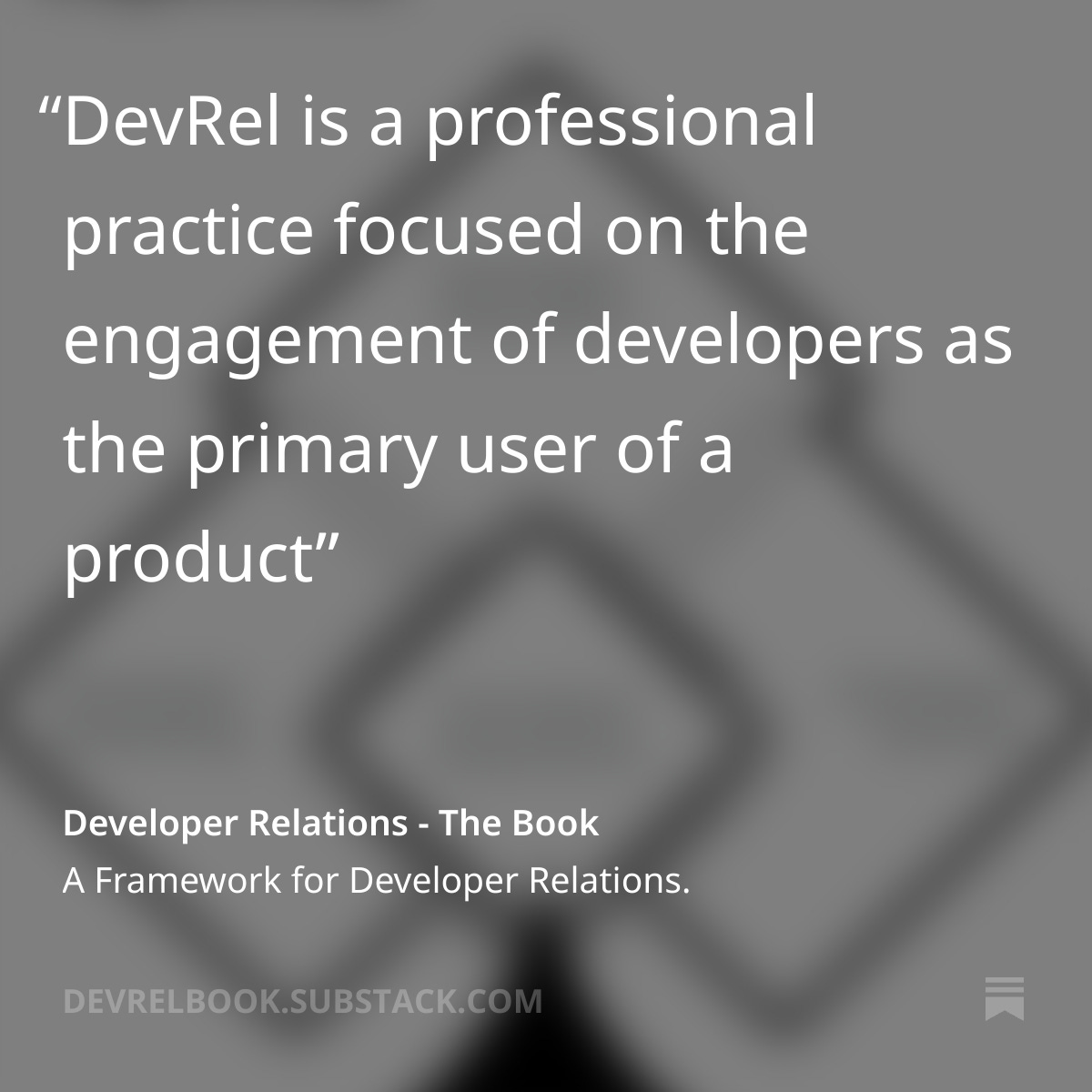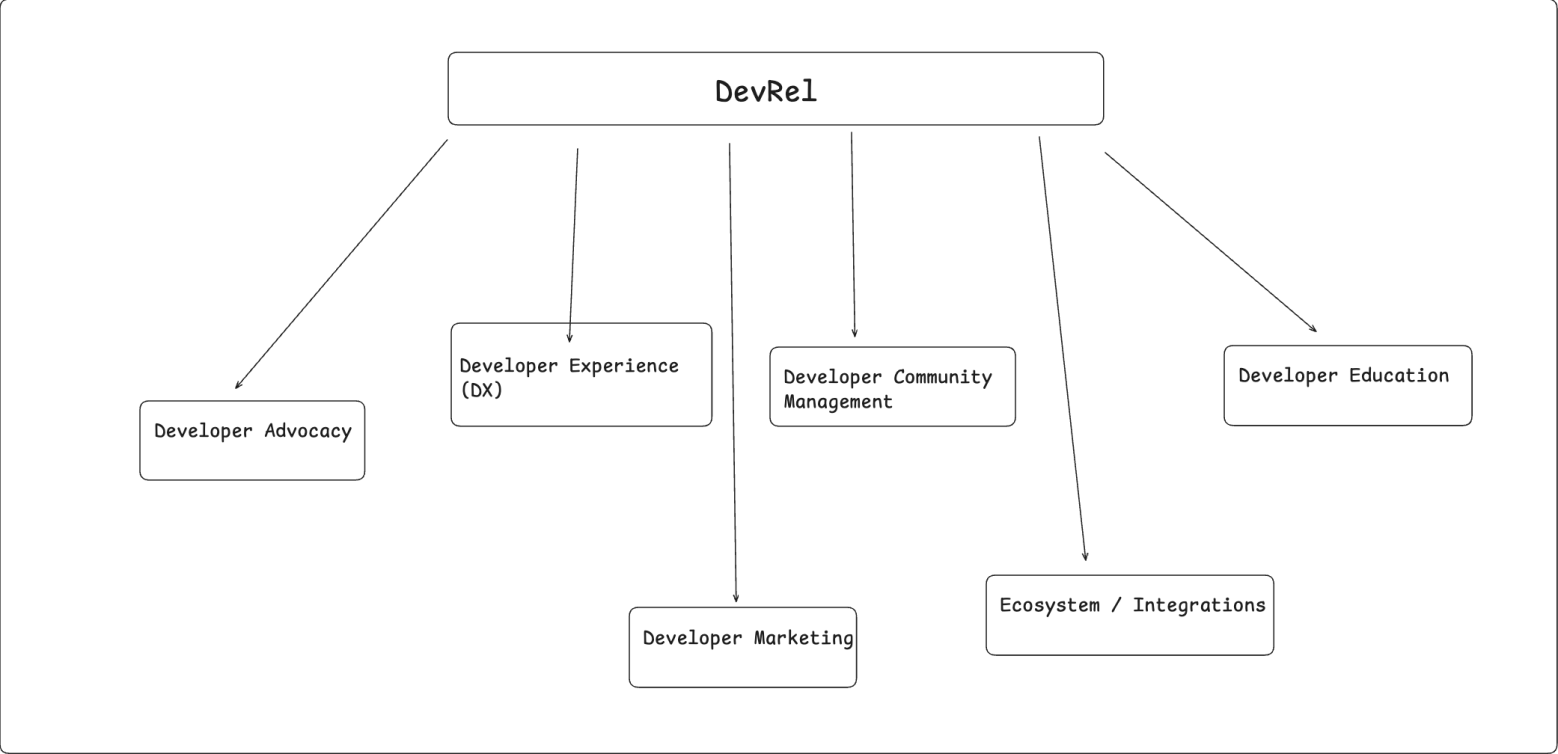DevRel Demystified: How to Get Started as a Beginner
 Samuel Uzor
Samuel Uzor
I recently got accepted into the DXMentorship Program for its 4th cohort. The program is a 90-day program aimed at equipping you with the skills needed to kickstart your career in DevRel. As part of the program, I have been tasked to write about my thoughts on Developer Relations (DevRel), sharing my insights on its impact, challenges, and best practices in the industry.
In this article, I’ll dive into what DevRel means to me, why it matters, and how it contributes to developers and businesses.
What is Developer Relations(DevRel)?
It has become more crucial these days that the gap between developers, products, and communities is bridged. To help achieve this where DevRel comes in — a field with the sole aim of fostering strong relationships between developers and the organizations creating tools, platforms and services for them.
Developer Relations (DevRel) is a field focused on building and nurturing relationships between technology companies and developers. It serves as a bridge between a company’s product team and the developers who use their tools, APIs, or platforms.

Now that we know what DevRel is, let’s look at some of the goals or purposes of DevRel.
What is the Purpose of DevRel?
The main goal of DevRel is to create a strong and engaged developer community while improving the developer experience (DX). This involves:
Advocating for Developers – Ensuring that the company listens to developers’ needs, feedback, and pain points.
Educating and Supporting Developers – Providing high-quality documentation, tutorials, and resources to help developers succeed.
Growing a Developer Community – Engaging with developers through social media, forums, events, and open-source projects.
Improving Product Adoption – Helping developers integrate and use the company’s technology effectively.
Building Trust and Loyalty – Creating a sense of connection and collaboration between developers and the company.
It is important to note that at its core, DevRel is all about empowering developers, fostering innovation, and creating a win-win relationship between companies and their developer ecosystems.
The Core Pillars of DevRel
DevRel is built on a few key pillars that guide its success. These pillars ensure that DevRel efforts are impactful toward building a strong relationships between developers,products and communities.
The core pillars include:
Developer Advocacy: Acting as a bridge between developers and the company or product, ensuring that developer feedback shapes product improvements.
Developer Education: Providing high-quality resources such as documentation, blog posts, videos, and tutorials to help developers learn and adopt technology.
Community Building: Creating spaces where developers can connect, collaborate, and grow through forums, events, and online engagement.
DevRel is a role that is a change for developers, not just for people coming from PR or Marketting. ~Christian Heilmann
Why DevRel Matters
DevRel plays a very important role in the success of technology companies and the broader developer ecosystem. It is more than just a support or marketing strategy or tool but a bridge that connects developers with the tools, resources, and communities they need to succeed.
Here are a few reasons why DevRel matters;
Improves Developer Experience (DX): A great developer experience is important for the adoption and success of any developer-focused product, whether it's an API, framework, or cloud platform. DevRel ensures that documentation is clear, SDKs are intuitive, and onboarding is smooth, reducing friction for developers.
Strengthens Developer Communities: Developers thrive in strong, supportive communities where they can collaborate, ask questions, and share insights. DevRel fosters these communities through events, online forums, and social engagement, creating a sense of belonging and shared growth.
Increases Brand Trust and Awareness: Companies with strong DevRel programs build trust and credibility among developers. By being transparent, responsive, and genuinely invested in developer success, a company gains goodwill, which translates into advocacy and organic word-of-mouth growth.
Acts as a Feedback Loop for Product Improvement: Developers who use the product provide valuable insights into how it performs in real-world scenarios. DevRel serves as a channel between the developer community and internal product teams, helping to prioritize features, fix pain points, and improve the overall offering.
Bridges the Gap Between Developers and Business Goals: While developers are focused on solving technical challenges, businesses need to meet strategic goals. DevRel aligns both perspectives by ensuring that developer needs are met while also driving company growth through engagement and community-driven innovation.
Challenges in DevRel
Like every other field, DevRel is not entirely lacking in its share of challenges. Balancing community needs with business goals, measuring impact, and maintaining authenticity are just a few hurdles that DevRel professionals often face.
Below are some of the key challenges in DevRel;
Measuring Success and ROI: Unlike sales or marketing, where KPIs like revenue or conversion rates are clear, DevRel's success is harder to quantify.
Balancing Business Needs with Developer Trust: Because DevRel sits at the intersection of business and community, this sometimes creates conflicts. Developers expect authenticity, transparency, and genuine engagement, while companies often want DevRel to drive product adoption and revenue.
Scaling DevRel Efforts: As developer communities grow, scaling DevRel efforts becomes challenging. A small DevRel team may struggle to engage thousands (or even millions) of developers globally.
Keeping the Developer Community Engaged: Consistently providing value through meaningful conversations, fresh content, and interactive events is key, but it requires continuous effort and adaptation to keep up with the changing interests of developers.
Staying Ahead of Rapidly Evolving Technology: The tech ecosystem evolves quickly, and DevRel professionals must stay up-to-date with new frameworks, tools, and best practices. This requires continuous learning and adapting DevRel strategies accordingly. Staying up to date with recent changes while maintaining deep technical expertise is an ongoing challenge for DevRel teams.
Navigating Internal Misalignment: Without a clear goal of what is expected, DevRel can become pulled in multiple directions, leading to inefficiency and burnout as a result of different teams having different expectations of DevRel
Avoiding Burnout: DevRel professionals often wear multiple hats—community manager, content creator, speaker, advocate, and product liaison. The demands of frequent travel, event organization, and constant engagement can lead to burnout.
Dev-Rel: Become a Dev first before Relations. ~Idris Olubisi(DXMentorship Alumnus)
Skills Needed for DevRel Success
Developer Relations (DevRel) is a multidisciplinary role that requires a unique combination of technical expertise, communication skills, and community-building abilities. To succeed in DevRel, professionals must navigate the intersection of engineering, marketing, advocacy, and product management. Below are the key skills essential for thriving in DevRel.
Technical Proficiency: Even if a DevRel professional isn’t actively developing products, they need to understand the developer mindset and be able to have meaningful technical discussions.
Communication and Storytelling: The DevRel professional should be able to take a technical concept and explain it in an engaging and accessible way
Community Building and Engagement: A thriving developer community doesn’t just happen—it requires consistent effort, authentic engagement, and fostering a culture of collaboration.
Empathy and Advocacy: Successful DevRel professionals act as a bridge between developers and the company, which requires a deep sense of empathy. Empathy is the foundation of strong relationships and trust within the developer ecosystem.
Content Strategy and Documentation: Great content helps onboard new developers, showcases best practices, and positions the company as a thought leader.
Event Planning and Public Speaking: Whether it’s a small community meetup or a major conference keynote, events play a crucial role in DevRel success.
Data Analysis and Feedback Loop: Without data, it's hard to prove the success of DevRel programs, so the ability to track and analyze impact is key.
Business Acumen and Cross-Team Collaboration: DevRel professionals must align their efforts with business goals while maintaining trust within the developer community.
Roles in DevRel
As you must have seen from the purpose and core pillars of DevRel, you can tell that it’s a broad field with a lot of specialties for you to pick from. Some of the DevRel roles include;
Developer Advocacy: Always represented with the Avocodo fruit(🥑). A Developer Advocate as defined by Christian Heilmann is a spokesperson, mediator, or translator between a company and its technical staff and outside developers.
Developer Experience (DX) Engineer: The DX Engineer works to improve the developer's experience with a product, paying particular attention to tooling, SDKs, and documentation.
Developer Marketing: Drives product awareness and adoption among developers through content creation, campaigns, and developer events.
Developer Community Management: Creating and maintaining development communities both physically and online, encouraging participation and cooperation.
Developer Education: Create instructional materials, guides, and workshops to help developers learn and efficiently use a product.
Ecosystem/Integrations: Create a pathway or system to integrate the product smoothly into the ecosystem and retain adoption.

Tips for Breaking into DevRel as a Newcomer/Beginner
The DevRel space is quite a competitive and tasking one. Here are a few tips to break in as a beginner;
Learn to Write
Learn to build bridges or network with people in the ecosystem
Teach as you learn
Learn to speak
Act like one
My Perspective on DevRel
As someone deeply immersed in the world of frontend development and community-driven projects, my journey has given me a unique perspective on Developer Relations (DevRel). I see DevRel as more than just a role—it's a bridge between developers and the companies building tools for them. It’s about advocacy, education, and fostering genuine relationships that lead to long-term engagement and trust.
From my experience contributing to open-source projects, working in tech communities, and leading teams, I’ve come to appreciate the subtle differences in what makes DevRel impactful. Here are a few key aspects that shape my personal view on DevRel:
DevRel is about people, not just technology.
Technical education is a game changer.
Authenticity matters more than marketing.
Community engagement is a two-way street.
Measuring DevRel’s impact is tricky, but crucial.
DevRel is constantly evolving.
Conclusion
DevRel plays an important role in bridging the gap between developers and the companies building tools for them. By focusing on advocacy, education, and community engagement, DevRel helps foster trust, drive adoption, and create meaningful relationships within the tech ecosystem.
While it comes with challenges, the impact of DevRel is undeniable—empowering developers, improving products through feedback, and building stronger, more connected communities. As the field continues to evolve, one thing remains constant: at its core, DevRel is about people, not just technology.
If you have read this far, I hope this article served as a helpful resource to learn more about DevRel. Let me know in the comments if you found this article helpful.
Resources
The Developer Advocacy Book by Christian Heilmann
Defining Developer Relations by Phil Leggetter
How to Start Doing Dev Rel Right Now by Sam Julien
7 Tips for Breaking Into DevRel by Nader Dabit
Bonus
Found this tool by the amazing Phil Leggetter. that will help you if you're still unsure about which aspect of DevRel suits. Its called the DevRelOMeter. It’s a fun way to get some clarity! Just choose the activities you enjoy or plan to focus on, and it will suggest which path aligns with your approach. Give it a spin and see where you fit!
Subscribe to my newsletter
Read articles from Samuel Uzor directly inside your inbox. Subscribe to the newsletter, and don't miss out.
Written by

Samuel Uzor
Samuel Uzor
Hi, I'm Samuel. I write technical articles on web development. This includes daily problems I face and how I solve them, tools, discoveries, how-to guides, and more. Welcome!